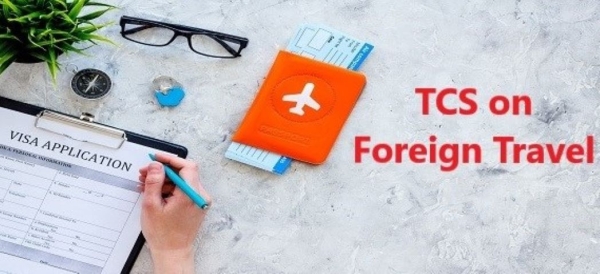New 20% TCS rule: 4 tips to bring down TCS to zero during your next international trip
Please note that it is the responsibility of the travel agent to collect TCS, whether online or offline, even when you are paying in the rupee. So, even if you
- by B2B Desk 2023-10-12 09:06:38
If you are planning to go on an international trip with your family, be prepared to bear a higher cost upfront due to the new tax collected at source (TCS) rule. When you book, offline or online, overseas tour packages worth more than Rs 7 lakh in a financial year, you have to pay TCS 20% from 1 October 2023. If the foreign tour package is up to Rs 7 lakh, TCS will be levied at 5%. Is there a way to reduce this additional upfront cost? Read on to find out.
What is the new TCS rule on overseas tour packages from 1 October 2023?
Let us first understand what constitutes an overseas tour package. The Ministry of Finance has clearly defined this term to make it easier for taxpayers.
“To qualify as an overseas tour program package, there must be at least two of the following: international travel ticket; hotel accommodation (with or without food, boarding, or lodging); any other expenses of a similar nature or in relation thereto.”
Please note that it is the responsibility of the travel agent to collect TCS, whether online or offline, even when you are paying in the rupee. So, even if you book your overseas tour from domestic online travel aggregators like MakeMyTrip, Yatra, or EaseMyTrip, you will have to pay TCS at the specified rate.

How to plan your travel abroad to reduce TCS to zero
Given the escalation in upfront cost due to the new rule, is there a way to avoid paying high TCS charges while traveling abroad? Yes, if you book your flights, hotels, and tours separately, rather than making one booking, they will not be considered an all-inclusive tour. The higher TCS fare will not be applicable to such bookings.
“Purchasing only an international ticket or purchasing hotel accommodation alone does not fall under the definition of ‘outbound itinerary package,’” says Neeraj Agarwala, Partner, Nangia Andersen India. “Hence, travelers should consider purchasing international tickets and booking accommodation in Hotels separately through different websites or travel agents."
Are you going on an international vacation? How to use Rs 7 lakh TCS threshold
TCS is not limited to overseas tour packages. You will have to pay tax even if you remit money from India. Now, TCS does not remit up to Rs 7 lakh in a financial year. But if you send more than Rs 7 lakh annually, you will be charged 20% TCS from October 1, 2023, except in certain cases. No TCS on debit cards and credit card spending up to Rs 7 lakh in a financial year. "The threshold of Rs 7 lakh applies qua remitter," says Agarwala.
So, when you go on an overseas trip with your family or as part of a group, different people can book different things and avail the maximum limit of Rs 7 lakh. For example, one person in the group could pay for the flight and another for the hotel stay. "Make prudent use of the Rs 7 lakh exemption limit per person per annum for TCS. If two people are travelling, consider splitting the foreign exchange amount between them," says Sudarshan Motwani, Founder and CEO, BookMyForex.com.

No TCS on international credit card transactions
As of now, there is no TCS for international credit card transactions. "Currently, international credit cards do not incur TCS, unlike regular credit cards. Opting for an international credit card for your foreign
travel expenses can help you avoid additional tax liability," says Rikant Pittie, co-founder of EaseMyTrip. However, remember the additional fees that come with a credit card transaction before swiping it abroad.The maximum limit of INR 7 lakh for purchasing an overseas tour package is independent of the LRS threshold
The overall limit of Rs 7 lakh is a combined threshold for all categories under the liberalized Remittance Scheme (LRS) payments for all payment modes, regardless of the purpose. So, even if you pay with a debit card for one trip and pay via bank transfer for another, TCS will apply if the total amount exceeds Rs 7 lakh in a year. However, the minimum limit of Rs 7 lakh per financial year for purchasing a foreign tour package is independent of the LRS threshold.
“There are two distinct thresholds for TCS under LRS and for purchasing overseas tour packages. The threshold for TCS under LRS is Rs 7 lakh,” Sajish Pillai, Managing Director and Head of Assets and Strategic Alliances, Consumer Banking Group, DBS Bank India, says. A threshold of Rs 7 lakh discounted rate of 5% TCS is applicable on the purchase of outbound tourism packages. The Finance Ministry has clarified that these thresholds apply independently."
Let us understand it better with examples.
For example, ‘A’ books an overseas tour package worth Rs 5 lakh in the month of November. In January, he traveled abroad for a medical treatment worth Rs 4 lakh. In February, he again booked a tour package worth Rs 4 lakh. How much TCS will be deducted? Who will collect it?
"The threshold of Rs 7 lakh applies separately for remittances made under LRS and for purchase of overseas tour packages. For LRS, the threshold of Rs 7 lakh is to determine whether TCS is applicable or not. For the purchase of an overseas tour package, “Rs 7 lakh is applied to determine the applicable TCS rate of 5% or 20%,” says Divakar Vijayasarathy, Founder and CEO, of DVS Advisors.
The tax will be collected as follows: On the November package of Rs 5 lakh, TCS will be levied at 5%, says Pillai. So, ‘A’ has to pay TCS Rs 25,000. He adds that the TCS will be collected by the “seller” of the overseas tour package.
The seller must undertake that more than Rs 7 lakh has been spent on overseas tour packages thus far in the financial year concerned. This undertaking enables the seller to apply a lower TCS rate, says Agarwala of Nangia Andersen India.
For the medical treatment trip, a TCS fee of 5% will be charged if the amount exceeds Rs 7 lakh. But since A spent only Rs 4 lakh via the LRS route, TCS will not apply, explains Pillai. “However, he must submit an undertaking to the agent or authorized bank stating the purpose of the transfer and stating that it does not exceed the threshold of Rs 7 lakh,” adds Agarwala.
Then comes the February tour package or Rs 4 lakh. In this case, A will have to pay TCS 5% for spending up to Rs 7 lakh on tour packages in a financial year, and 20% to TCS on the higher amount. Therefore, the amounts for the months of November and February (Rs 5 lakh and Rs 4 lakh respectively) will be used for calculation.
So, for the February trip, A will have to pay TCS 5% on Rs 2 lakh (threshold of Rs 7 lakh minus Rs 5 lakh from November) and TCS 20% on the remaining Rs 2 lakh of the tour package amount.
Here's another example: B booked an overseas tour package worth Rs 6 lakh in October and another tour package worth Rs 4 lakh in January. How much TCS will be deducted? Who will collect it?
On the first booking of Rs 6 lakh, the seller will charge 5% TCS. To qualify for the reduced TCS rate, B must furnish an undertaking to the seller confirming that no amount over Rs 7 lakh has been spent on overseas tour packages during the respective financial year. This undertaking enables the seller to apply a lower TCS rate.
"With regard to the Rs 4 lakh overseas tour package in February, Rs 1 lakh (Rs 7 lakh threshold minus October’s Rs 6 lakh) will be subjected to TCS at 5%, and the remaining Rs 3 lakh (February’s Rs 4 lakh minus the balance of Rs 1 lakh in the threshold) will be subject to TCS at 20%. The seller of the overseas tour package is responsible for collecting TCS. The bank also has the option to request an undertaking from the customer to collect information on previous remittances," says Pillai.

Will TCS be levied if you book international trips from foreign websites?
Nowadays, several people book flight
tickets, hotels, and sightseeing trips through foreign travel portals for international travel. Are such bookings also subject to TCS? "The law has not clarified whether foreign websites are also required to collect TCS from Indian users. However, to my knowledge, no foreign website is planning to collect TCS on tour packages," says Ankit Jain, Partner, Ved Jain & Associates.The primary obligation to collect TCS on purchase on purchase of overseas tour packages falls on the seller of the package, says Raju Kumar, tax partner at EY India.
Now, if you are planning to use an international website to avoid TCS, beware of fraudulent platforms. Don't fall prey to online scams to save some pennies.
There are several ways individuals can protect themselves from such foreign websites. Rikant Pittie of EaseMyTrip says that when booking international flights using a third-party online platform, it is better to check the website carefully before making payments. Look for customer reviews and ratings and check for warning signs indicating fraudulent activity. Verify that the site uses secure payment gateways. Trusted payment options like Visa, Mastercard, or PayPal are best, Pittie says. Additionally, make sure the website has a valid SSL certificate and uses HTTPS encryption for secure data transfer. Check if the website provides valid contact details, such as a physical address, phone number, or email address, he adds.
TCS is not an additional tax
Finally, remember that TCS is not an additional income tax. You can adjust the amount deducted as TCS against your tax liability while filing your Income Tax Return (ITR). If you don't have any tax liability, you can get TCS as a refund. However, paying TCS can lead to a cash flow crunch as the amount is locked until you receive your refund.
Also Read: RBI may conduct Rs 500 billion worth bond sales: Treasury officials
POPULAR POSTS
Loan EMIs to Drop as RBI Slashes Repo Rate - Full MPC December 2025 Highlights
by Shan, 2025-12-05 11:49:44
Zoho Mail vs Gmail (2025): Which Email Platform Is Best for Businesses, Startups, and Students?
by Shan, 2025-10-09 12:17:26
PM Modi Launches GST Bachat Utsav: Lower Taxes, More Savings for Every Indian Household
by Shan, 2025-09-24 12:20:59
$100K H-1B Visa Fee Explained: Trump’s New Rule, Clarifications & Impact on Indian Tech Workers
by Shan, 2025-09-22 10:11:03
India-US Trade Deal Soon? Chief US Negotiator Arrives in Delhi as Talks Set to Begin Tomorrow
by Shan, 2025-09-15 11:54:28
Modi Meets Xi: Trump’s Tariffs, Strategic Autonomy, and the Future of Asia’s Power Balance
by Shan, 2025-09-03 06:40:06
Google Claims Gemini AI Uses Just ‘Five Drops of Water’ Per Prompt, Sparks Debate
by Shan, 2025-08-22 12:34:27
RECENTLY PUBLISHED

Pine Labs IPO 2025: Listing Date, Grey Market Premium, and Expert Outlook
- by Shan, 2025-11-05 09:57:07

The Agentic Revolution: Why Salesforce Is Betting Its Future on AI Agents
- by Shan, 2025-11-05 10:29:23

Top 10 Insurance Companies in India 2026: Life, Health, and General Insurance Leaders Explained
- by Shan, 2025-10-30 10:06:42

OpenAI Offers ChatGPT Go Free in India: What’s Behind This Big AI Giveaway?
- by Shan, 2025-10-28 12:19:11

Best Silver Investment Platforms for 2025: From CFDs to Digital Vaults Explained
- by Shan, 2025-10-23 12:22:46





 Subscribe now
Subscribe now 